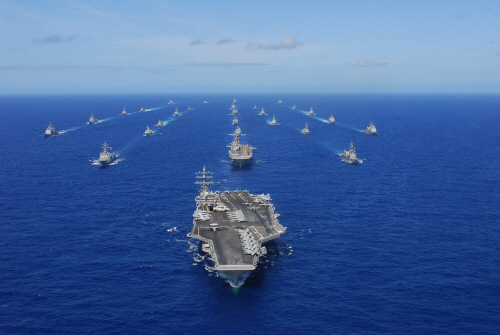 Source: Wikipedia Source: Wikipedia |
Fears of a military build-up East Asia are undermining efforts to build solid institutional structures that assure stability for the region and integrate the United States in a manner that is not threatening, but rather one that welcomes cooperation with China on critical strategic issues.
At the same time, tensions between China and Japan over territorial issues, combined with disputes over historical issues such as the Korean comfort women, have created a political environment that encourages military responses and confrontation. The recent nuclear test by North Korea has heightened the distrust to such a level that we can look forward to a massive arms race that will involve not only the nations of Northeast Asia, but possibly those of Southeast Asia as well.
Now is the moment for moral courage on the part of the United States. The United States, and specifically the Pacific Command, must step forward and engage in honest and practical dialog on security issues. It needs to suggest innovative, collaborative approaches to security problems, interacting with all the nations of the region in a transparent manner that encourages cooperation, not competition. We must make sure that security and defense policies are not rooted in an unimaginative and outdated Cold War conception of deterrence and containment, but rather are responses to emerging nontraditional threats.
The recent Paris Climate Conference (COP 21 Paris) has laid down concrete demands for a rapid shift to a low-carbon model for development that should serve as the basis for closer collaboration in military affairs between the United States, Japan, Korea and China, and ASEAN nations.
The Pacific Command should engage all members of the Asian community in a deep dialog about how the region’s militaries can transform military relations in the region. This transformation would take place through the military’s transitioning to play a leading role in mitigating and adapting to climate change, and it would create a new, regional, cooperative culture in the Pacific.
The Pacific Command can play a critical role in the green revolution by promoting a 100 percent renewable energy policy internally. Unlike civilian parts of the economy, the Pacific Command can simply order that all vehicles employed within the military must be electric within two years and insist on the use of solar panels on all buildings on all bases in the interest of national security. The Pacific Command can thereby first establish a large market within the military for solar panels, wind farms, and electric batteries, which will assure that there is a guaranteed demand for such products.
But it must go much further. It is possible to build on the tradition of military-military exchanges already established by the RIMPAC (Rim of the Pacific) exercises to create a platform for broader cooperation.
The U.S. Navy’s Pacific Fleet in Pearl Harbor hosts the biannual RIMPAC Exercises in June and July, an immensely successful program that encourages global military cooperation and helps to reduce regional tensions in East Asia.
The RIMPAC Exercises invite representatives of military forces from the entire Pacific Rim to participate in military exercises that promote enhanced interoperability among forces and improve readiness for a wide range of military scenarios. The most important result of the RIMPAC Exercises has been the growth of personal relations and practical military-to-military partnerships throughout the region at the working level.
Significantly, the People’s Liberation Army Navy was invited to participate in the 2014 exercises, marking the first time China has joined a large-scale naval drill organized by the United States and including the Japan Maritime Self-Defense Force. The 2016 RIMPAC will also include India, making it an opportunity for truly global cooperation.
Meaningful multilateral military cooperation on issues like cyber warfare and climate change, which by their very nature are complex and demand multilateral responses, is our future, and we should move quickly to embrace this reality.
 Prof. Emanuel Pastreich, Senior Advisor, AsiaToday Prof. Emanuel Pastreich, Senior Advisor, AsiaToday |
The Pacific Command should propose a “climate change RIMPAC” that will bring together working-level officers from Pacific Rim nations for exercises that will build a new level of trust in the region and make military exercises an opportunity for unity, rather than creating new tensions. Mitigation of, and adaptation to, the resulting broad security threats resulting from climate change will be the purpose of a “Climate Change RIMPAC.”
In light of the recent report by the renowned NASA scientist James Hansen on the rapid rise of sea levels, formulating a global response to the threat of climate change should be the primary priority for all militaries of Asia, particularly the various countries’ navies. And yet although the military has started to factor in climate change for strategic planning, we have not even started to talk about the revolutionary changes necessary for the military to retool and meet the challenges of mitigation of, and adaption to, climate change. Such a show of leadership will inspire the youth within the U.S. military to embrace a culture of service and sacrifice.
The Climate Change RIMPAC exercises could focus on drills for the response to security challenges resulting from climate change – for example, evacuation from flooding, disaster relief, and reconstruction following storms and floods. Recent super-typhoons like Nargis (2008) and Haiyan (2013) demonstrate that such responses will be increasingly important in Asia. As such storms increasingly tend northward, we will need a global, cooperative response to these emergencies.
In addition to rescue and relief exercises, the Climate Change RIMPAC exercises can include global competitions between militaries of Asia and the U.S. Pacific Command to develop and show off new environmentally friendly technologies with broad applications. This effort will make competition between Asian militaries a positive, rather than negative, process.
The U.S. Department of Defense’s “Smart Power Infrastructure Demonstration for Energy Reliability and Security,” or SPIDERS, program is a good example of what could be done. In 2013, the SPIDERS program conducted the world’s first-ever test of a micro-grid handling an input of 90 percent renewable energy.
Nations participating in the climate change RIMPAC exercises could compete for prizes for new technologies in fields like solar and wind power, electric batteries, power grids, environmental conservation practices, and the use of intelligence and surveillance technologies to monitor and respond to the changing state of the oceans using a multilateral platform. The result of such efforts will be to transform the region’s militaries into leaders in conservation, rather than shameful wasters of resources.
Such competitions will have even more impact if they are held together with an international conference, wherein the invited militaries can present papers about their advances in fields related to climate change. Topics like military policy, and new technologies relevant to recycling, energy efficiency, water security, electric motors, and the prevention of desertification are all potential subjects. Equally important would be a general military agreement to turn all uninhabited islands into ecologically protected zones that cannot be exploited, thereby reducing the potential for conflicts.
These Climate Change RIMPAC exercises could build on the agreement established between U.S. President Barack Obama and Chinese President Xi Jinping’s summit in November 2014 for military cooperation and a joint response to climate change.
Finally, the Climate Change RIMPAC exercises also can serve as an opportunity to establish an international think tank that is dedicated to the critical topic of the military’s role in mitigating and adapting to climate change.
Although this topic is guaranteed to attract increasing attention in the years ahead, as yet there is no think tank dedicated to the military’s role in the response to climate change. Given the global consensus on climate change, a think tank focused on military reform as part of a response to climate change would offer a neutral space where military leaders from across Asia could meet for discussions on a range of topics without any fear of political fallout.
In the face of a dangerous trend toward confrontation between Japan and China, between the United States and Russia, and between Saudi Arabia and Iran, this is the moment to create momentum away from chaos and toward peace. Paraphrasing the ancient philosopher Hillel the Elder, I call on the members of the United States military to ask, “If not me, who? If not now, when?”
Most Read
-
1
-
2
-
3
-
4
-
5
-
6
-
7





















